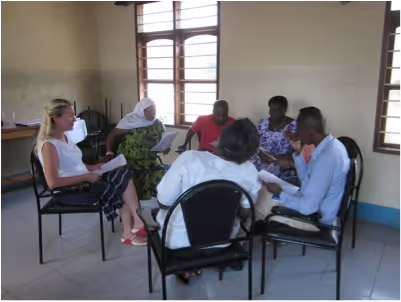RAM-OP Field Testing

HelpAge International, Valid International and Brixton Health are developing an innovative method of assessing the needs of older people in emergencies, including their nutritional needs. The Rapid Assessment Method for Older People (RAM-OP) is meant to offer a simple, quick, reliable, robust and cost effective method for assessing the nutritional status and vulnerabilities of older people in emergencies.
The second RAM-OP field test has taken place in Tanzania: Kibaha District Council, west of Dar es Salaam. This district is largely rural. HelpAge is already working there with a partner, the Good Samaritan Social Service Trust (GSSST).
The field test consists in carrying out one RAM survey and one SMART survey, at the same time and in the same district. To achieve this, I recruited three supervisors (one Kenyan Nutritionist and one Tanzanian supervisor to work with the enumerators, and one British epidemiologist to supervise the double data entry) and one facilitator from the Good Samaritan to ensure the links with the local authorities (Regional and District Administration and Medical Teams, Ward and Villages Executive Committees).
We trained 17 enumerators for a week. The training was in Swahili and in English, and included field procedures, practicing the questionnaire, learning how to measure MUAC (middle upper arm circumference) in older people, how to perform a visual acuity test using a tumbling E, how to behave with older people in the local context, etc. The last day of raining was a field test, where the teams were sent to the filed in the survey’s conditions. At the end of the week, 14 enumerators were recruited as well as 2 data entry clerks.
The surveys started on the 1st September, and finished on the 6th September for the data collection, on the 7th October for the data entry, according to the planning. Everything went fine, there was no logistic problem, the teams were able to reach their target every day (each team interviewing either 16 older people for RAM or 22 for SMART), older people were generally very happy to be involved in a survey, and everybody worked hard.
We visited 30 villages sampled from the whole Kibaha District Council. For RAM we interviewed 196 older people (target: 192), and for SMART, 703 (target: 636).
The next steps will be to analyse the data, separately for SMART and RAM, and compare the results, in terms of prevalence and confidence intervals, but also costs, time, etc… A report on the Kibaha District Council survey will be written, using the combined data of the two surveys, and shared with the Tanzanian authorities and HelpAge partners and staff in Tanzania.
Many thanks to the older people in Kibaha District Council who made it possible, to the teams of dedicated enumerators, data entry clerks and supervisors who all worked very hard, to our partner the Good Samaritan Social Service Trust, whose contacts and knowledge of the area were precious, and to the HelpAge International office in Tanzania, for their support in the whole process.

Stay updated
Sign up for our newsletter to receive regular updates on resources, news, and insights like this. Don’t miss out on important information that can help you stay informed and engaged.
Explore Elrha
Learn more about our mission, the organisations we support, and the resources we provide to drive research and innovation in humanitarian response.


.png)